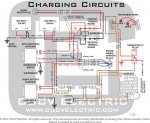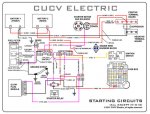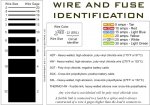-
Steel Soldiers now has a few new forums, read more about it at: New Munitions Forums!
my 24v mess
- Thread starter Wncenergy
- Start date

More options
Who Replied?Wncenergy
New member
- 42
- 0
- 0
- Location
- Weaverville nc
Really appreciate all the opinions and awesome information. i have learned so much this evening. Since no mechanic in 50 miles wants to touch it before I hacked it, I look forward to redeeming myself on it. Being a framing carpenter alot of my work is up in the mountains. The idea of running an inverter seems very appealing. Best advice I think I have gotten so far was just to slow down! Looks like I am going to have a couple of alternators hanging around so I might as well keep it 24v. I would like to rebuild the old alternators but considering family, work etc it might take me awhile.
Also I do have a switch on the dash I hold up for the glow plugs is this the aftermarket bypass Scott and others had mentioned? I will take more and better pictures of the starter, wires and everything tomorrow. Thanks again guys. Wish I had read more before I started driving the truck!
Also I do have a switch on the dash I hold up for the glow plugs is this the aftermarket bypass Scott and others had mentioned? I will take more and better pictures of the starter, wires and everything tomorrow. Thanks again guys. Wish I had read more before I started driving the truck!
If you need help pm me and i will give you my number and we can talk! Ive worked on alot of these that have been hacked up!Really appreciate all the opinions and awesome information. i have learned so much this evening. Since no mechanic in 50 miles wants to touch it before I hacked it, I look forward to redeeming myself on it. Being a framing carpenter alot of my work is up in the mountains. The idea of running an inverter seems very appealing. Best advice I think I have gotten so far was just to slow down! Looks like I am going to have a couple of alternators hanging around so I might as well keep it 24v. I would like to rebuild the old alternators but considering family, work etc it might take me awhile.
Also I do have a switch on the dash I hold up for the glow plugs is this the aftermarket bypass Scott and others had mentioned? I will take more and better pictures of the starter, wires and everything tomorrow. Thanks again guys. Wish I had read more before I started driving the truck!
You can run a inverter off of 12 volts, you do not have to have 24. You can run smaller gauge wires to your inverter if you use 24v vs 12v, that is one benefit. i have not priced the difference between a 24v vs 12 v inverters either, that may be a consideration. I just know on my 1009 that the military alternators were weird and not a common stock item, therefore I made mine so it could be cheaply and easily repaired. It can use a alternator off of almost anything now and starters are in stock at every parts store.Really appreciate all the opinions and awesome information. i have learned so much this evening. Since no mechanic in 50 miles wants to touch it before I hacked it, I look forward to redeeming myself on it. Being a framing carpenter alot of my work is up in the mountains. The idea of running an inverter seems very appealing. Best advice I think I have gotten so far was just to slow down! Looks like I am going to have a couple of alternators hanging around so I might as well keep it 24v. I would like to rebuild the old alternators but considering family, work etc it might take me awhile.
Also I do have a switch on the dash I hold up for the glow plugs is this the aftermarket bypass Scott and others had mentioned? I will take more and better pictures of the starter, wires and everything tomorrow. Thanks again guys. Wish I had read more before I started driving the truck!
Miah
Member
- 90
- 29
- 18
- Location
- Kansas City-ish, MO
Floating ground 24V alternator? Please don't add to the op's confusion. If his m1009 is stock it might have 2x 12v alternators w/ isolated grounds, but he only requires 1 for the pass side. He can replace the driver's side w/ a reasonably available high-output alt & have the pass side rebuilt or an isolated ground alt can be ordered in(part#'s are floating around the forum here). If he has 2 isolated ground alts,he can have the 2nd rebuilt as an emergency backup if that's such a big deal.Well it kinda is? If he has 2 possibly burnt up alternators, Where is he going to find the floating ground 24 volt alternator? While his stuff is smoked he might as well convert it now,wouldnt you say?He says no mechanic will touch it within 50 miles cause they do not understand the 24 volt system, all he has to do now is install a 12 volt alternator, 12 volt starter and wire the batteries in parallel and use a few simple rewiring steps to assure no backfeed and he is fixed and done. Every mechanic he visits in the future WILL understand his setup.But carry on Ill butt out and leave ya`ll to your vises.
Last edited:
wayne pick
New member
- 658
- 2
- 0
- Location
- Valley Cottage NY
 With the scarcity of qualified mechanics in his area, it's probably his best option. Infighting between members does the OP no good. It also makes us look bad to newcomers,my
With the scarcity of qualified mechanics in his area, it's probably his best option. Infighting between members does the OP no good. It also makes us look bad to newcomers,myMarcusOReallyus
Well-known member
- 4,524
- 820
- 113
- Location
- Virginia
Best advice I think I have gotten so far was just to slow down!
Yep. Don't sweat it - we'll get you there.
One more piece of advice - completely ignore the 12v/24v debate. What's important right now is to get you back up and running. The shortest route to that goal is fixing the stock configuration, helped out by the knowledgeable members here.

Also I do have a switch on the dash I hold up for the glow plugs is this the aftermarket bypass Scott and others had mentioned?
Yes, but don't worry about that now. It won't affect what you need to do to get the truck running. Time enough later to decide if you want to change that arrangement.
- 34,010
- 1,827
- 113
- Location
- GA Mountains
EDIT: Removed text from meyerhvacReally appreciate all the opinions and awesome information. i have learned so much this evening. Since no mechanic in 50 miles wants to touch it before I hacked it, I look forward to redeeming myself on it. Being a framing carpenter alot of my work is up in the mountains. The idea of running an inverter seems very appealing. Best advice I think I have gotten so far was just to slow down! Looks like I am going to have a couple of alternators hanging around so I might as well keep it 24v. I would like to rebuild the old alternators but considering family, work etc it might take me awhile.
Also I do have a switch on the dash I hold up for the glow plugs is this the aftermarket bypass Scott and others had mentioned? I will take more and better pictures of the starter, wires and everything tomorrow. Thanks again guys. Wish I had read more before I started driving the truck!
Arrgh...The original poster has already indicated that he wants to leave it 24V. Can we drop the 12/24 debate and help this guy get his truck back on the road please?
If you have something constructive to restoring his 24V system, please offer it up. If not, let those willing to help do so without interruption.
Last edited by a moderator:
First off the AAA guy had no clue how your truck should be wired. I was in a hospital once but have no clue on how to do brain surgery. But I did stay at Holiday Inn Express.
What you did by hooking the smaller red wire to the positive lug of the rear battery was to send 24v thru the entire 12v system. I'm sure something fried.
Looking at the wiring diagrams for the batteries and the alternators will help.
The way GM wired the batteries is this:
1 - Front battery negative goes to ground in two places. A 2 gauge wire to the Negative Terminal Block and 10 gauge wire to the radiator support. From the Negative Terminal Block the engine and frame SHOULD also be connected
2 - Front battery positive - 4 gauge wire to the negative of the rear battery. Normaly this is where you get 12v for the rest of the truck but the CUCV is slightly different. We will get the 12v in the next step.
3 - Rear battery negative - 12v for the truck is accessed from here. The smaller 8 gauge wire runs from this terminal to 12v diamond shaped power block by the brake master cylinder. It is protected by a 12 gauge fusible link.
4 - Rear Battery Positive - With the batteries wired in series you now have 24v at this terminal. A 2 gauge wire is attached to the 24v Positive Terminal Board.
You will need to disconnect your batteries, check the terminals, and have them load tested. They should be okay but check them first to make sure.
I would have your alternators rebuilt. You do not know what condition they where in to begin with and they may now be compromised. You can get rebuild kits for about $40 each. It isn't very hard to do. Just takes time and attention to detail.
The procedure is covered in the TM 9-2320-289-34 tech manual.
You may have toasted a couple of fusible links also. Only way to tell is by tracing the wires and testing them.
I haven't asked. Do you own a voltmeter and know how to use it?
What you did by hooking the smaller red wire to the positive lug of the rear battery was to send 24v thru the entire 12v system. I'm sure something fried.
Looking at the wiring diagrams for the batteries and the alternators will help.
The way GM wired the batteries is this:
1 - Front battery negative goes to ground in two places. A 2 gauge wire to the Negative Terminal Block and 10 gauge wire to the radiator support. From the Negative Terminal Block the engine and frame SHOULD also be connected
2 - Front battery positive - 4 gauge wire to the negative of the rear battery. Normaly this is where you get 12v for the rest of the truck but the CUCV is slightly different. We will get the 12v in the next step.
3 - Rear battery negative - 12v for the truck is accessed from here. The smaller 8 gauge wire runs from this terminal to 12v diamond shaped power block by the brake master cylinder. It is protected by a 12 gauge fusible link.
4 - Rear Battery Positive - With the batteries wired in series you now have 24v at this terminal. A 2 gauge wire is attached to the 24v Positive Terminal Board.
You will need to disconnect your batteries, check the terminals, and have them load tested. They should be okay but check them first to make sure.
I would have your alternators rebuilt. You do not know what condition they where in to begin with and they may now be compromised. You can get rebuild kits for about $40 each. It isn't very hard to do. Just takes time and attention to detail.
The procedure is covered in the TM 9-2320-289-34 tech manual.
You may have toasted a couple of fusible links also. Only way to tell is by tracing the wires and testing them.
I haven't asked. Do you own a voltmeter and know how to use it?
Attachments
-
96.3 KB Views: 38
-
77.8 KB Views: 40
-
94.2 KB Views: 31
Last edited:
Wncenergy
New member
- 42
- 0
- 0
- Location
- Weaverville nc
Just getting in from a long day. But after spending a couple hours last night reading through the forums I have a much better grasp of the situation. I did get the batteries wired back right when I got home tonight but it wouldn't turn over. I am sure I drained the batteries. I cringe at calling AAA about them. I am going to try and find order the rebuild kits tonight, the connections on them looked real rough and I am sure that along with my wire to my starter needs to be replaced. I have some more pictures of the set up and the starter. Will try to post shortly. I have learned an incredible amount over the last 48 hours and feel much better about the situation. I wish I had a day to devote and work on it this week, but work finally has picked up so I am going to have do it in spurts in the evening.
richingalveston
Well-known member
- 1,715
- 122
- 63
- Location
- galveston/Texas
I would get a regular 12 volt charger and charge each battery while it is disconnected. if it is cold out, take the batteries inside and charge them overnight. The meter on the charger should let you know if they take a charge or not.
Wncenergy
New member
- 42
- 0
- 0
- Location
- Weaverville nc
I do have a voltmeter and I do not really have a good grasp of it
Wncenergy
New member
- 42
- 0
- 0
- Location
- Weaverville nc
I like that idea Rich much better than calling AAA
MarcusOReallyus
Well-known member
- 4,524
- 820
- 113
- Location
- Virginia
Agreed. Step 1 is charge the batteries.
MarcusOReallyus
Well-known member
- 4,524
- 820
- 113
- Location
- Virginia
Good. You've got one, now to figure out how to use it.I do have a voltmeter and I do not really have a good grasp of it
A voltmeter (more correctly called a multimeter) will tell you four kinds of things about electricity:
- Volts. That's pretty simple - how many jolts have ya got?
- Current. That's electrical flow.
- Resistance. How much restriction of electrical flow?
- Continuity. Does that wire really connect end to end?
Let's take these one at a time. We'll use an analogy to try to make it simple. You can think of an electrical circuit like a plumbing system. (A supply system, not a drain system.) You have water pressure, water flow, you have some restrictions here and there (a narrow spot in a pipe), and some valves here and there. Switches are like valves.
Voltage: Think of voltage like the water pressure. When you have higher pressure, you can do more work with the water. If your pressure goes up, and the pipe is the same size, you'll get more flow. The water is being pushed harder. That's like higher voltage. Another word for voltage is electrical potential.
Current: That's how much electricity is flowing in a circuit. It's measured in amperage, or amps. More amps in a circuit is like having more flow through a pipe. Water flow is measured in gallons per minute (gpm).
Resistance: Resistance is just that - a property that resists the flow of electricity. It's always there to some degree, even in a clean copper wire. In water pipes, scale buildup on the inside of the pipe will increase the resistance to flow, which will mean less flow. Same in an electrical circuit. Corrosion can build up which increases resistance, which reduces current (amperage). We can also put resistors into a circuit on purpose, for various reasons. We measure resistance in ohms. Somebody might tell you to measure resistance, or measure ohms. Same thing. Fatter wires have less resistance than skinny wires.
Continuity: This is a bit misleading. The "continuity" setting on a multimeter is really just an ohm measurement with either a buzzer or tone or a light to tell you there's almost zero resistance. Instead of getting a number output, you get a go/no-go test. There's continuity (a complete circuit) or there's not. Simple.
There's the basics.
Here are a few tips:
On most multimeters, you have to put the leads into different sockets to measure current or voltage/ohms. Make sure you pay attention to that. It should be marked on your meter.
When you do a continuity test or measure ohms, don't have your batteries connected. You can get wonky results.
Pay attention to polarity. You want the black lead (normally) to be in contact with ground when you are measuring voltage. Red to hot, black to ground. You've heard that somewhere else, mebbe...
I hope that helps you get started. Holler with questions.

- 114,318members
- 167,213threads
- 2,353,970posts
- 3,760online users




